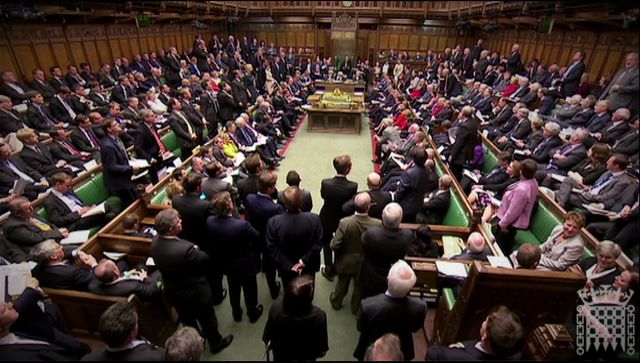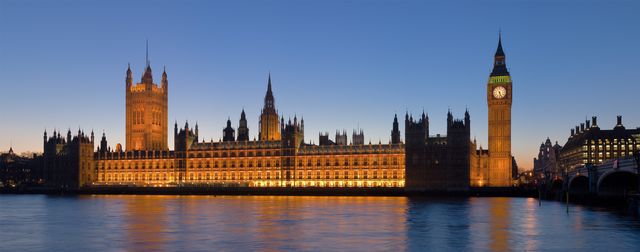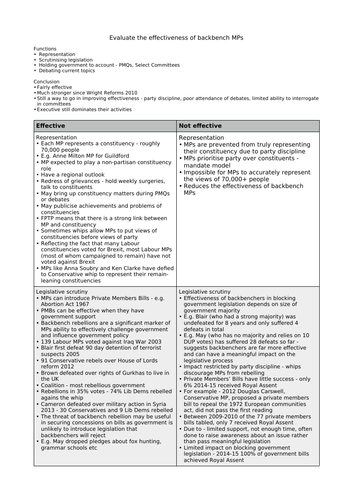Backbenchers
Backbenchers are MPs in the House of Commons and members of the House of Lords that are not part of the government or the opposition party’s leadership team.


Backbenchers as Representatives
- Backbenchers represent UK citizens through impacting on laws and scrutinising the government.
- Backbenchers in the House of Commons represent the interests of the citizens in their constituency.

Government policy and legislation
- Backbenchers in the House of Commons represent their constituents' interests and should vote on legislation in a way which meets their constituents’ interests.
- House of Lords' backbenchers look to improve legislation.
- All backbenchers can speak in Parliamentary debates over legislation.
- Backbenchers can participate in voting in favour of or against legislation.
- Backbenchers are members of standing committees which review bills in detail.
- Backbenchers can put forward Private Members’ bills.

Government scrutiny
- Backbenchers scrutinise the government and hold it accountable for its actions.
- Backbenchers can question government ministers during Question time and the Prime Minister in Prime Minister’s Questions on their policies and actions to ensure they are held to account.
- Backbenchers make up and chair select committees which scrutinise government departments.
- Backbench MPs can write questions to ministers about issues which impact their constituents which ministers must reply to.

Party delegates
- Backbenchers are expected to support their party in Parliament.
- Backbenchers of the party in government are expected to not overly criticise the government and to follow the party line when voting.
- Backbenchers of the opposition parties have a role to oppose the government through criticism in ministers questions and voting against government policies.

Parliamentary privilege
- Parliamentary privilege enables backbenchers to carry out their roles, particularly representing the electorate’s interests through having free speech.
- Parliamentary privilege ensures that MPs and members of the House of Lords can freely debate on any issue without interference.
- MPs used their parliamentary privilege during the Ryan Giggs affair to name the footballer who had taken out an injunction over an affair.
Significance of Backbenchers
Backbenchers can have a significant role, but party whips can reduce this, as well as how willing the government is to support private members' bills and select committees

Significant role: rebellions
- Backbenchers often make up the majority of a party in Parliament. The government’s backbenchers are important to pass legislation.
- Backbench rebellions can change the direction of government policy.
- In 2012, 91 Conservative backbenchers voted against coalition government plans for House of Lords reform.

Significant role: constituency
- Backbenchers are important for the voices of their constituencies to be heard - and can spend more time in their constituencies because they are not ministers. -Rebelling backbenchers often prioritise their constituency.

Significant role: other
- Backbenchers can change public policy by introducing Private Members’ Bills.
- Backbenchers in committees can hold government ministers to account and research policies.

Not significant role
- If a ‘three-line whip’ is enacted, backbenchers risk being removed from their party and having to sit as an independent in parliament if they vote against the party’s position.
- Private members’ bills are rarely successful, especially if the government doesn’t back them.
- Select committees are often ignored by the Government.
1 Democracy & Participation
1.1 Representative & Direct Democracy
1.1.1 Direct Democracy
1.1.2 Pros & Cons of Direct Democracy
1.1.3 Representative Democracy
1.1.4 Pros & Cons of Representative Democracy
1.1.5 Comparing Types of Democracy
1.1.6 Case for Democratic Reform
1.1.7 End of Topic Test - Types of Democracy
1.1.8 Top Grade AO3/4 - Types of Democracy
1.2 Wider Franchise & Suffrage
1.2.1 History of the UK Franchise
1.2.2 Campaigns for Suffrage
1.2.3 End of Topic Test - Franchise & Suffrage
1.3 Pressure Groups & Other Influences
1.3.1 Types of Pressure Group
1.3.2 Functions of Pressure Groups
1.3.3 How Pressure Groups Influence
1.3.4 Case-Study Examples
1.3.5 Other Collective Orgs & Groups
1.3.6 End of Topic Test - Pressure Groups & Influences
1.3.7 Application Questions - Pressure Groups
1.4 Rights in Context
1.4.1 Development of Rights in the UK
1.4.2 The UK's Rights-Based Culture
1.4.3 End of Topic Test - Rights in Context
2 Political Parties
2.1 How Political Parties Work
2.1.1 Functions & Features of UK Political Parties
2.1.2 Funding of UK Political Parties
2.1.3 UK Funding Reform
2.1.4 End of Topic Test - Political Parties
2.1.5 Top Grade AO3/4 - Political Parties
2.2 Established Political Parties
2.2.1 The Conservative Party: History
2.2.2 The Conservative Party: Recent Leaders
2.2.3 The Labour Party
2.2.4 The Liberal Democrat Party
2.2.5 Ideas & Policies of UK Parties
2.2.6 End of Topic Test - Established Parties
2.2.7 Application Questions - Established Parties
2.3 Emerging & Minor Political Parties
2.3.1 Minority Parties
2.3.2 Minority Parties Case Studies
2.3.3 End of Topic Test - Minor Parties
2.4 UK Political Parties in Context
2.4.1 Different Party Systems
2.4.2 Political Spectrum
2.4.3 Factors Affecting Party Success
2.4.4 End of Topic Test - Parties in Context
2.4.5 Application Questions - Parties in Context
3 Electoral Systems
3.1 Different Electoral Systems
3.1.1 FPTP & STV
3.1.2 AMS & SV
3.1.3 End of Topic Test - Electoral Systems
3.1.4 Top Grade AO3/4 - Electoral Systems
3.2 Referendums & How They Are Used
3.2.1 Case For & Against Referendums
3.2.2 End of Topic Test - Referendums
3.2.3 A-A* (AO3/4) - Referendums
3.3 Electoral System Analysis
3.3.1 Electoral System Analysis
3.3.2 End of Topic Test - System Analysis
3.3.3 A-A* (AO3/4) - Electoral System Analysis
4 Voting Behaviour & the Media
4.1 General Election Case Studies
4.1.1 Case Studies of Elections
4.1.2 Factors Influencing Voting in Elections
4.1.3 End of Topic Test - Case Studies & Factors
4.1.4 A-A* (AO3/4) - Case Studies & Voting
4.2 Media Influence
4.2.1 Media Influence
4.2.2 End of Topic Test - Media Influence
5 Conservatism
5.1 Conservatism: Core Ideas & Principles
5.1.1 Pragmatism & Tradition
5.1.2 Human Imperfection & Organic Society/State
5.1.3 Authority & Hierarchy
5.1.4 Paternalism
5.1.5 Empiricism
5.1.6 Anti-Permissiveness
5.1.7 Radical Conservative Ideas
5.1.8 End of Topic Test - Core Conservatism
5.2 Conservatism: Differing Views & Tensions
5.2.1 Traditional Conservatism
5.2.2 One-Nation Conservatism
5.2.3 New Right Conservatism
5.2.4 End of Topic Test - Different Views
5.3 Conservative Thinkers & Ideas
5.3.1 Thomas Hobbes & Edmund Burke
5.3.2 Michael Oakeshott & Ayn Rand
5.3.3 Robert Nozick
5.3.4 End of Topic Test - Conservative Thinkers
5.3.5 A-A* (AO3/4) - Conservatism
6 Liberalism
6.1 Liberalism: Core Ideas & Principles
6.1.1 Individualism & Freedom/Liberty
6.1.2 The State & Rationalism
6.1.3 Equality & Social Justice
6.1.4 Liberal Democracy
6.1.5 Other Important Liberal Ideas
6.1.6 End of Topic Test - Liberalism
6.2 Differing Views And Tensions Within Liberalism
6.2.1 Classical Liberalism
6.2.2 Modern Liberalism
6.2.3 End of Topic Test - Tensions & Views
6.3 Liberal Thinkers & Ideas
6.3.1 John Locke & Mary Wollstonecraft
6.3.2 John Stuart Mill & John Rawls
6.3.3 Betty Friedan
6.3.4 End of Topic Test - Thinkers & Ideas
6.3.5 A-A* - Liberalism
7 Socialism
7.1 Socialism: Core Ideas & Principles
7.1.1 Fraternity & Co-operation
7.1.2 Capitalism & Common Ownership
7.1.3 Communism
7.1.4 Collectivism
7.1.5 Common Humanity
7.1.6 Equality
7.1.7 Social Class & Workers' Control
7.1.8 End of Topic Test - Socialism
7.2 Differing Views And Tensions Within Socialism
7.2.1 Differing Views And Tensions
7.2.2 End of Topic Test - Views & Tensions
7.3 Socialist Thinkers and Their Ideas
7.3.1 Socialist Thinkers: Marx & Engels
7.3.2 Socialist Thinkers: Webb & Luxemburg
7.3.3 Socialist Thinkers: Crosland and Giddens
7.3.4 End of Topic Test - Thinkers & Ideas
7.3.5 A-A* (AO3/4) - Socialism
8 The UK Constitution
8.1 Nature & Sources of UK Constitution
8.1.1 Development of the UK Constitution
8.1.2 Nature of the UK Constitution
8.1.3 Sources of the UK Constitution
8.1.4 End of Topic Test - Nature & Sources
8.2 Constitutional Change since 1997
8.2.1 Constitutional Reform 1997-2010 1
8.2.2 Constitutional Reform 1997-2010 2
8.2.3 Constitutional Reform 2010-15 & Reforms Since 2015
8.2.4 End of Topic Test - Reform
8.2.5 Application Questions - Reform
8.3 Role & Powers of Devolved UK Bodies
8.3.1 Devolution in England & Scotland
8.3.2 Devolution in Wales & Northern Ireland
8.3.3 End of Topic Test - Devolution
8.4 Debates on Constitutional Reform
8.4.1 Constitutional Reform & Devolution
8.4.2 Should the Constitution Be Codified?
8.4.3 End of Topic Test - Reform Debates
8.4.4 Application Questions - Codification & Devolution
9 The UK Parliament
9.1 Houses of Parliament
9.1.1 Houses of Parliament
9.1.2 Functions of the House of Commons
9.1.3 Functions of the House of Lords
9.1.4 End of Topic Test - Parliament
9.1.5 Top Grade AO3/4 - Parliament
9.2 Comparative Powers
9.2.1 Comparative Powers of the Houses
9.2.2 End of Topic Test - Comparative Powers
9.3 Legislative Process
9.3.1 Legislative Stages
9.3.2 Law-Making in the two Houses
9.3.3 End of Topic Test - Legislative Process
9.4 Parliament & Executive Interactions
9.4.1 Backbenchers
9.4.2 Select Committees
9.4.3 The Opposition
9.4.4 Ministerial Question Time
9.4.5 End of Topic Test - Parliament & Executive
9.4.6 Application Questions - Parliament & Executive
10 The Prime Minister & the Executive
10.1 The Executive
10.1.1 Structure of the Executive
10.1.2 Roles of the Executive
10.1.3 Powers of the Executive
10.1.4 End of Topic Test - PM & Executive
10.2 Ministerial Responsibility
10.2.1 Individual Ministerial Responsibility
10.2.2 Collective Ministerial Responsibility
10.2.3 End of Topic Test - Ministerial Responsibility
10.3 Prime Minister & the Cabinet
10.3.1 Role of the Prime Minister
10.3.2 Prime Minister's Powers
10.3.3 Limits on the Prime Minister's Powers
10.3.4 Role of the Cabinet
10.3.5 Prime Minister & Cabinet: Relations
10.3.6 Prime Minister & Cabinet: Balance of Power
10.3.7 Prime Minister & Cabinet: Case Studies
10.3.8 End of Topic Test - PM & Cabinet
10.3.9 Top Grade AO3/4 - PM & Cabinet
11 Relationships Between Government Branches
11.1 The Supreme Court
11.1.1 Role & Composition
11.1.2 Principles & Influence of the Supreme Court
11.1.3 End of Topic Test - Supreme Court
11.2 Parliament & Executive Relations
11.2.1 Parliament & Executive: Questions
11.2.2 Parliament & Executive: Committees
11.2.3 Parliament & Executive: Voting
11.2.4 Executive Dominance Over Parliament
11.2.5 Balance of Power
11.2.6 End of Topic Test - Parliament & Executive
11.2.7 A-A* (AO3/4) - Relationships Between Government
11.3 The European Union & the UK
11.3.1 Aims & Policy Making of the European Union
11.3.2 End of Topic Test - EU & UK
11.4 Sovereignty in the UK Political System
11.4.1 Sovereignty in the UK Political System
11.4.2 End of Topic Test - Sovereignty
12 US Constitution & Federalism
12.1 Nature of the US Constitution
12.1.1 Nature of the US Constitution
12.1.2 Nature: Positives & Negatives
12.1.3 Constitutional Framework
12.1.4 The Amendment Process
12.1.5 End of Topic Test - Nature US Constitution
12.2 Principles of the US Constitution
12.2.1 Federalism
12.2.2 Separation of Powers/Checks & Balances
12.2.3 Bipartisanship
12.2.4 Limited Government
12.2.5 End of Topic Test - Constitutional Principles
12.3 Federalism
12.3.1 Main Characteristics
12.3.2 Federal Government and the States
12.3.3 End of Topic Test - Federalism
12.4 Interpretations & Debates
12.4.1 Democracy in the Constitution
12.4.2 Federalism
12.4.3 End of Topic Test - Debates
12.4.4 A-A* (AO3/4) - US Constitution
13 US Congress
13.1 Structure of Congress
13.1.1 Structure of Congress
13.1.2 Distribution of Powers
13.1.3 End of Topic Test - Congress Structure
13.2 Functions of Congress
13.2.1 Representation
13.2.2 Legislative
13.2.3 Oversight
13.2.4 End of Topic Test - Functions of Congress
13.3 Interpretations & Debates
13.3.1 Changing Roles & Powers
13.3.2 Changing Significance of Parties & of Powers
13.3.3 End of Topic Test - Debates
13.3.4 Application Questions - US Congress
14 US Presidency
14.1 Presidential Power
14.1.1 Formal Sources of Presidential Power
14.1.2 Informal Sources of Presidential Power
14.1.3 Powers of Persuasion
14.1.4 End of Topic Test - Presidential Power
14.2 The Presidency
14.2.1 President Relationship with Other Institutions
14.2.2 Limitations on Presidential Power
14.2.3 US Presidents Achieving Their Aims
14.2.4 End of Topic Test - Presidency
14.3 Interpretations & Debates of the US Presidency
14.3.1 The Imperial Presidency
14.3.2 The President in Foreign Policy
14.3.3 End of Topic Test - Debates
14.3.4 A-A* (AO3/4) - US Presidency
15 US Supreme Court & Civil Rights
15.1 Nature & Role of Supreme Court
15.1.1 Nature & Role of the Supreme Court
15.1.2 End of Topic Test - Nature & Role
15.2 Supreme Court Appointment Process
15.2.1 Appointment Process
15.2.2 Supreme Court Membership
15.2.3 End of Topic Test - Appointments
15.3 The Supreme Court & Public Policy
15.3.1 Supreme Court & Public Policy
15.3.2 End of Topic Test - Public Policy
15.4 Protection of Civil Liberties & Rights
15.4.1 Protection of Civil Liberties & Rights
15.4.2 Race & Rights in Contemporary US Politics
15.4.3 End of Topic Test - Rights & Liberties
15.5 Debates & Interpretations of the Supreme Court
15.5.1 Political Nature of the Supreme Court
15.5.2 Judicial Interpretation
15.5.3 Supreme Court Checks & Balances
15.5.4 End of Topic Test - Debates
15.5.5 Application Questions - The Supreme Court
16 US Democracy & Participation
16.1 Presidential Elections
16.1.1 Presidential Elections
16.1.2 Primaries
16.1.3 National Party Conventions
16.1.4 End of Topic Test - Presidential Elections
16.2 Electoral College
16.2.1 Electoral College System
16.2.2 Reforms
16.2.3 End of Topic Test - Electoral College
16.3 Electoral Campaigns
16.3.1 Issues in Elections
16.3.2 End of Topic Test - Campaigns
16.4 Incumbency
16.4.1 Elections & Incumbency
16.4.2 End of Topic Test - Incumbency
16.4.3 A-A* (AO3/4) - Elections & Electoral College
16.5 Democrats & Republicans
16.5.1 National & State Level Organisation
16.5.2 Democratic & Republican Policies
16.5.3 Changing Party Significance
16.5.4 End of Topic Test - Democrats & Republicans
16.6 Internal Conflict & Ideology
16.6.1 Types of Democrats
16.6.2 Types of Republicans
16.6.3 End of Topic Test - Internal Conflict
16.7 Support & Demographics
16.7.1 Coalition of Supporters
16.7.2 End of Topic Test - Party Support
16.8 Interest Groups
16.8.1 Political Significance of Interest Groups
16.8.2 Interest Group Influence & Impact on Democracy
16.8.3 End of Topic Test - Interest Groups
16.8.4 Application Questions - Parties, Ideology & Groups
17 Comparing Democracies
17.1 Theoretical Approaches
17.1.1 Theoretical Approaches
17.1.2 End of Topic Test - Approaches
17.2 UK & USA Similarities & Differences
17.2.1 Constitution: Nature
17.2.2 Constitution: Provisions & Principles
17.2.3 Federal System & Devolution
17.2.4 Legislative: Lower Houses of Government
17.2.5 Legislative: Upper Houses of Government
17.2.6 Legislative: Powers & Functions
17.2.7 Executive
17.2.8 Supreme Court
17.2.9 Supreme Court: Judicial Independence
17.2.10 Civil Rights
17.2.11 Civil Rights: Interest Groups
17.2.12 Party Systems & Parties
17.2.13 Campaign Finance & Pressure Groups
17.2.14 End of Topic Test - Comparing UK & US
17.2.15 Application Questions - UK & USA
18 Feminism
18.1 Feminism: Core Ideas & Principles
18.1.1 Context of Feminism
18.1.2 Sex & Gender
18.1.3 Patriarchy & The Personal is the Political
18.1.4 Difference, Egalitarian & Intersectionality
18.1.5 Key Themes
18.1.6 End of Topic Test - Core Ideas & Principles
18.2 Different Types of Feminism
18.2.1 The Waves of Feminism
18.2.2 Socialist & Radical Feminism
18.2.3 Post-Modern Feminism
18.2.4 End of Topic Test - Different Types of Feminism
18.3 Feminist Thinkers & Their Ideas
18.3.1 Charlotte Gilman & Simone de Beauvoir
18.3.2 Kate Millett
18.3.3 Sheila Rowbotham & bell hooks
18.3.4 End of Topic Test - Feminist Thinkers & Ideas
18.3.5 A-A* (AO3/4) - Feminism
19 Nationalism
19.1 Nationalism: Core Ideas & Principles
19.1.1 Nations & Self-Determination
19.1.2 Nation-States & Culturalism
19.1.3 Racialism & Internationalism
19.1.4 Civic & Ethnic Nationalism
19.1.5 Liberal & Socialist Internationalism
19.1.6 Key Themes
19.1.7 End of Topic Test - Core Ideas & Principles
19.2 Different Types of Nationalism
19.2.1 Liberal & Conservative Nationalism
19.2.2 Post-Colonial & Expansionist Nationalism
19.2.3 Progressive & Regressive Nationalism
19.2.4 Inclusive & Exclusive Nationalism
19.2.5 End of Topic Test -Different Types of Nationalism
19.3 Nationalist Thinkers & Their Ideas
19.3.1 Jean-Jacques Rousseau & Gottfried von Herder
19.3.2 Giuseppe Mazzini & Charles Maurras
19.3.3 Marcus Garvey
19.3.4 End of Topic Test - Nationalist Thinkers & Ideas
19.3.5 A-A* (AO3/4) - Nationalism
Jump to other topics

Unlock your full potential with GoStudent tutoring
Affordable 1:1 tutoring from the comfort of your home
Tutors are matched to your specific learning needs
30+ school subjects covered
End of Topic Test - Legislative Process
Select Committees
Final dates! Join the tutor2u subject teams in London for a day of exam technique and revision at the cinema. Learn more →
Reference Library
Collections
- See what's new
- All Resources
- Student Resources
- Assessment Resources
- Teaching Resources
- CPD Courses
- Livestreams
Study notes, videos, interactive activities and more!
Politics news, insights and enrichment
Currated collections of free resources
Browse resources by topic
- All Politics Resources
Resource Selections
Currated lists of resources
- In the News
How the government faced down a backbench rebellion
14th July 2021
- Share on Facebook
- Share on Twitter
- Share by Email
The foreign aid cuts and what it says about the role of MPs
I've written before about how backbenchers are far from the sheep that we considered them to be as recently as the 1990s.
Here in late January: https://www.tutor2u.net/politi...
In December of last year: https://www.tutor2u.net/politi...
And here: https://www.tutor2u.net/politi...
While we’re here it is worth considering again the question as to why MPs are more rebellious.
One explanation for the increasing independence of MPs is that party loyalty among the electorate is no longer as high, i.e. partisan dealignment has occurred so that voters no longer vote blindly according to previous psychologically based attachments. We could add that the rise of the career politician also helps us understand this trend. This runs contrary to a great deal of media criticism, which contends that those who have entered the Commons without real-world experience, or a profession, to fall back on are more likely to do what their respective party whips command of them because this type of MP wants to be promoted. In fact, because MPs of this nature have been steeped in politics long before entering the Commons, the argument is that they can spot flaws in government plans and vote for what they as being the best course of action for their constituents.
What I like about the foreign cut story in the Guardian is how it details the way the potential government defeat on the issue was avoided.
So this is a good example of how the party machinery kicks in.
As the paper reports:
"After spending months trying to dodge an embarrassing defeat in the Commons on cutting international aid, the government sprang a last-minute vote and announced details of a “compromise” with 14 sceptical Tories.
What happened?
With Boris Johnson having a majority of 80 in parliament, the rebels’ ringleader, Andrew Mitchell, the former international development secretary, needed about 40 Conservatives to join him to scupper the government’s plan. After personal lobbying, Johnson and the chancellor, Rishi Sunak, managed to sway a small but significant number of waverers who voted with the government.
Despite attempts to force a vote on the issue in the past, there had been no formal declaration where MPs were forced to show their hand, so the number of rebels remained a mystery until the formal division. In the end, the government won comfortably by 333 votes to 298, with just 25 Tories rebelling. They included the former prime minister Theresa May and ex-cabinet members including Jeremy Hunt, Karen Bradley and David Davis."
You don't really need to know for the purposes of analysing the role of MPs in the A Level course the full details of the compromise. Just remember it as an example.
The article goes on:
"How did the government pull off a win?
Tory whips breathed a big sigh of relief that they had quietly managed to broker a deal ensuring 14 previously hesitant backbenchers would vote for Sunak’s proposal, including the former cabinet minister Andrea Leadsom. Some Conservative insiders said it was unlikely the government would have called the vote if it thought it was going to lose, though it was still a gamble.
However, given that the exact number of prospective Tory rebels had never been known – estimates ranged up to about 50 – the government still had reason to worry."
See the full story here: https://www.theguardian.com/po...
- Parliamentary democracy
- Backbenchers
- House of Commons
Mike McCartney
Mike is an experienced A-Level Politics teacher, author and examiner.
You might also like

Opposition Day - Tax Credits Debate
20th October 2015
Teaching Resources from the Parliament Education Team
11th September 2015
Adversary Politics
Study Notes
Parliamentary democracy
Party system (organisation of politics), prime minister's questions - political theatre or effective scrutiny.
15th October 2015

How useful are e-petitions?
3rd November 2015
Our subjects
- › Criminology
- › Economics
- › Geography
- › Health & Social Care
- › Psychology
- › Sociology
- › Teaching & learning resources
- › Student revision workshops
- › Online student courses
- › CPD for teachers
- › Livestreams
- › Teaching jobs
Boston House, 214 High Street, Boston Spa, West Yorkshire, LS23 6AD Tel: 01937 848885
- › Contact us
- › Terms of use
- › Privacy & cookies
© 2002-2024 Tutor2u Limited. Company Reg no: 04489574. VAT reg no 816865400.
- International
- Schools directory
- Resources Jobs Schools directory News Search

A Level Politics Essay Plan - effectiveness of Backbench MPs
Subject: Government and politics
Age range: 16+
Resource type: Other
Last updated
8 October 2019
- Share through email
- Share through twitter
- Share through linkedin
- Share through facebook
- Share through pinterest

Evaluate the effectiveness of Backbench MPs. A* essay plan
Tes paid licence How can I reuse this?
Your rating is required to reflect your happiness.
It's good to leave some feedback.
Something went wrong, please try again later.
Really helpful !
Empty reply does not make any sense for the end user
Report this resource to let us know if it violates our terms and conditions. Our customer service team will review your report and will be in touch.
Not quite what you were looking for? Search by keyword to find the right resource:

- TOP CATEGORIES
- AS and A Level
- University Degree
- International Baccalaureate
- Uncategorised
- 5 Star Essays
- Study Tools
- Study Guides
- Meet the Team
- United Kingdom
How effective are backbencher MPs?
How effective are Backbench MPs? Úna Richards 25/03/2013
A backbencher is an MP who does not hold governmental office, and is not a frontbencher spokesperson in the opposition. There is no said test of backbench MP efficiency, however we can come up with a measure of their effectiveness by looking at how effective they are within their role. What are they expected to do? Do they fulfil their role? In recent years, a large number of backbencher MPs have become more effective despite their limited air time, nowadays the majority of backbench MPs are often more active and involved in debates and plenary discussions.
A key function of backbencher MPs is that they represent the people of their own constituency whenever they are involved in government policy. It is typical for local MPs to bring up issues relating to their constituency and become active in decisions that are likely to affect their particular constituents. For example, when there emerged a proposal to build a third runway at Heathrow airport in 2009-10, the relevant MPs from constituencies in the Thames Valley, such as John McDonnel MP, actively opposed the plans or sought to change the details of those plans. When in debates and discussions MPs often try to represent the interests of their constituents, also they often represent pressure groups, either because the pressure group has funded them or the MP supports the group’s interest. Although many MPs successfully represent their constituents’ interests , it is arguable whether they actually represent the constituents, themselves. Indeed, roughly, only a fifth of Parliament are women, and only 4% are from minority ethnic groups, due to Parliament’s lack of diversity, it is questionable whether MPs are actually able to represent the population. Additionally, most MPs come from similar backgrounds: white, upper middleclass and have gone to Russell group universities such as Oxford and Cambridge. In this sense, Backbench MPs are ineffective in that they are unable to fully represent the people they are supposed to be representing. However, it should be stressed that in the last decade more and more female MPs and MPs from minority ethnic groups have become backbencher MPs, growing as a representative body and therefore becoming more effective.


This is a preview of the whole essay
Some backbencher MPs are largely ineffective in that they are sometimes unwilling to contribute their ideas, plans for policies and bills due to fear of how they will be received by the higher status politicians in Parliament. There is a common view that going against the PM/head of opposition and select committee ministers may have a negative effect on a backbencher’s political career, as they are less likely to get promoted. Therefore, they often lack influence or say in the government’s planned policies or bills. Although, occasionally it’s the courage of a backbench MP to criticise the government that works in their career’s favour, as they are seen as passionate about political issues. For example, Margaret Thatcher, when she was a backbencher in the early 60s, openly disagreed with the majority of the Conservative party on the topic of birching but within 3 years she had moved to the front bench of the Conservative party. Indeed, it is important to highlight that not all backbenchers are afraid of putting out their ideas for new legislation. For backbenchers, proposing legislation is a difficult process; it has to be financed by a pressure group or has to be strongly supported by the government. Perhaps, it’s for this reason that Backbencher effectiveness has come into question, a lot of the time it’s simply too difficult to make any kind of substantial difference because of backbencher status within Parliament. On the other hand, some may argue that in recent years particularly, backbenchers have been a lot more active, as their role has evolved over time and has gained more credibility in the political world due to the recent backbencher achievements. For example, Tom Watson, in his first year of being an MP for Labour in 2001, launched a campaign to ban album sales of convicted sex offender Gary Glitter, proving that backbenchers are effective.
A key function of Backbencher MPs is that they scrutinise the proposed work of the PM, the ministers in charge of the departmental committees and fellow Backbenchers. They aim to scrutinise both proposed primary and secondary legislation. A process that involves close inspection of specific legislation and, where it is seen necessary, amendments may be proposed. As backbenchers in legislative committees are whipped, they rarely defy government or express their own national interest. If a backbencher is defiant, he/she is at risk of being de-selected by the select committee he/she is part of. Another factor that makes a lot of backbenchers ineffective in terms of scrutiny is that many avoid challenging the more high-status members of Parliament due to their fear that if they were to do so it may harm the growth of their political career, and chances of promotion. Although it is important to stress this is only the case with some backbenchers, many are quick to scrutinise the actions and proposed legislation of the leading politicians in Parliament. In the 30 minute sessions they have for scrutiny, backbenchers closely investigate whether funds are being used effectively, and whether the government are acting in public interest. Many backbenchers express criticism towards the work of those that they scrutinise and are quick to offer improvements. Evidently, there is a mixture in the extent of effectiveness among backbenchers, but the majority are largely effective when it comes to their expected function, scrutiny.
Overall, backbenchers are effective in that they are largely able to fulfil their roles and the functions that come with the role. There are various backbenchers that have less prominence than others in Parliament but that’s not to say they are unable to represent, scrutinise or propose new legislation. Indeed, on a general scale, the majority of backbenchers are effective.

Document Details
- Author Type Student
- Word Count 1025
- Page Count 2
- Level AS and A Level
- Subject Politics
- Type of work Exam preparation
Related Essays

To What Extent Are Backbench MPs Lobby Fodder?

How effectively do MPs perform their representative function?

Explain how MPs can carry out their representative role

How effective is Parliament in checking Executive Power?
28 episodes
A podcast made by an A level politics teacher and editor of alevelpolitics.com to help students studying the subject. I cover UK and Global routes. Follow me on twitter @patelshop And visit my site https://www.alevelpolitics.com/ Sign up for my weekly news briefing
The A level Politics Podcast Mr Patel UK and Global
- 4.7 • 31 Ratings
- 22 SEPT 2021
Thatcherism and Boris Johnson
The Johnson government has intervened in the economy in recent weeks and the past year like no other Conservative government in recent history. My take. Go to my website www.alevelpolitics.com for exemplar essays and videos. Sign up to my weekly news bulletin here
Global A Level Politics Lesson The Eu and Vaccine Nationalism
This is the audio of a lesson I delivered to my students on the recent spat between the EU Commission and the UK and Astra Zeneca. It's an unedited lesson (sorry very unrefined) but I thought it would help with exampling the EU and Regionalism topic. I used a whiteboard in the lesson but I am sure you can follow it. Subscribe to my newsletter here
- 28 JAN 2021
Update: Select Committees and Backbenchers
I take a look at the recent role of select committees and backbenchers and how they have been pretty successful recently in holding the government to account. Access free essays here https://www.alevelpolitics.com Sign up to my weekly news briefing here https://alevelpolitics.substack.com Look out for my free webinar looking at political examples soon.
A Level Exams Cancelled: how to get the grade you need?
We cannot change government policy but it is within every students reach to still work towards a grade that will get them into university. Here are my tips on how to get through these next five months. Follow me on Twitter: https://twitter.com/patelshop Check out my site: https://www.alevelpolitics.com
Quick Essay Explainer - Is there a democratic deficit in the UK?
Bleta explains how you would write an essay looking at whether there is a democratic deficit in the UK? Follow me on twitter here https://twitter.com/patelshop Check out my politics courses here https://www.alevelpolitics.com/edexcel-politics-course
- 27 SEPT 2020
How to write a UCAS Personal Statement?
My tips on how to write a UCAS personal statement and how to sound genuine? Follow me on twitter here https://twitter.com/patelshop Check out my politics courses here https://www.alevelpolitics.com/edexcel-politics-course And join my weekly revision essay writing workshop here https://www.eventbrite.co.uk/e/a-level-politics-weekly-essay-workshop-tickets-121926319905
- © Mr Patel UK and Global
Customer Reviews
Please make more.
So good. Please please make more.
We need more
Love this podcast, really informative and useful for students to learn from. I’d encourage to team producing this podcast to make more as I’d certainly recommend it to everyone
Thank you, very helpful
Top Podcasts In News
The Politics Shed- A Free Text Book for all students of Politics.
Government & Politics A and AS Level
Contents - All courses
Edexcel A Level & AS Level
AQA A Level
Essays, Exams and Advice.
Video & podcast lessons , headlines, examples and links., click to open.
December 2023. Rwanda government threatens to pull out of the deal if it does not adhere to international law. Link: International agreements, human rights law, role of media.
December 2023 Robert Jenrick resigns after the publication of the emergency legislation that will disapply sections of the Human Rights Act responsibility, ministerial responsibility, power of PM vs Cabinet,
December 2023 The government will disapply sections of the Human Rights Act from its emergency Rwanda legalisation . Link: Human Rights in the UK, Sovereignty of Parliament The location of sovereignty in the UK
December 2023 . Rishi Sunak suffers his FIRST Commons defeat as PM over the infected blood scandal 246 to 242 in favour of a new body to help compensate - government majority wiped out Win for Labour, forcing him into a £20 billion spending commitment this year Link Role of backbenchers , power of PM
December 5th 2023 Senate confirms more than 400 military promotions after @SenTuberville (R-AL) dropped his months long blockade of the nominations, which he held up in protest of the Pentagon's abortion policies. Link: Party factions , abortion, Congress partisanship The powers of the Senate
Case Study: Rwanda Bill and Conservative Party Factions December 2023
13 December 2023 The Republican-led US House of Representatives has formally backed an impeachment inquiry into President Joe Biden.
Lawmakers voted 221 to 212 - entirely along party lines - on Wednesday to authorise a resolution that accuses the president of bribery, corruption and influence-peddling off his "brand".
link: Congress partisanship , The Impeachment of Trump , Is Congress the broken Branch?
Supreme Court to rule if Trump can run for president Jan 5th 2024
The Supreme Court and Public Policy
2023 Is Barbie a feminist movie? link Feminism
On 14 December 2023 the House of Commons Committee on Standards published a report on Scott Benton, the MP for Blackpool South. Recall of MPs Act 2015 Parliamentary Standards
January 2024 Case study Mr Bates v The Post Office Link Voting behaviour and the Media P arliamentary Sovereignty
January 2024: Voting intentions tracker 2024
Rwanda Bill: Lords effectiveness ,Constitutional Reform Elective Dictatorship.
Feb 2024 Wellingborough by-election was won by Gen Kitchen of the Labour Party. It was the biggest swing from the Conservatives to Labour since the 1994 Dudley West by-election and the second biggest since the Second World War. Recall of MPs Act 2015 Scott Benton: Lobbying scandal MP loses suspension appeal
Reform UK celebrates best-ever by-election result as Wellingborough candidate says the Tories 'need to go' Minor Parties
The popular conservatives (lol): launched by liz truss and jacob rees mogg in february 2024. the message was social conservatism (anti-woke) and libertarian economics- with the view that the conservative party was no longer conservative. conservative party factions .
April 2024 Trump claims presidential immunity. Presidential power & supreme Court neutrality. Case study Trump & the Supreme Court Unitary Executive Theory
MPs reject Lords amendments to Rwanda bill April 2024 :
Link: the evolving house of lords house of lords reform .
Elections Act 2022 Local government elections will use the new ID laws in May- link to the democratic deficit -powers of Parliament to change voting rights
Impeachment of AlejandroMayorkas links: Republican partisanship , 'Congress has become the least powerful branch of government' Discuss Is Congress the broken Branch?
Useful A-level textbooks
● Lynch, P., Fairclough, P. and Cooper, T. (2017) UK Government and Politics for AS/A-level, 5th edn, Hodder Education.
● McNaughton, N. (2017) Edexcel UK Government and Politics for AS/A-level, 5th edn, Hodder Education.
● Heywood, A. (2017) Essentials of UK Politics, 4th edn, Palgrave.
● Goodlad, G. and Mitchell, A. (2017) Edexcel GCE Politics AS and A-Level,Pearson Education.
● McNaughton, N. and Kelly, R. (2017) Political Ideas for A-level: Liberalism,
Conservatism, Socialism, Feminism, Anarchism, Hodder Education.
Conservatism, Socialism, Nationalism, Multiculturalism and Ecologism, Hodder Education.
● Bennett, A. (2017) US Government and Politics for A-level, 5th edn, Hodder Education.
● Murphy, R., Jefferies, J. and Gadsby, J. (2017) Global Politics for A-level, Hodder Education.
Essay Competitions
R.A. Butler Politics Prize — an essay competition by Trinity College, Cambridge with a choice of ten questions:
www.trin.cam.ac.uk/undergraduate/essay-prizes/
History of Parliament Competition — an essay competition in which you can write on any topic of your choosing relating to parliamentary or political history:
www.historyofparliamentonline.org/schools
➜ Robson History Prize — an history-based essay competition from Trinity College, Cambridge. There is choice of around 90 questions, many of which are politically themed:
➜ John Locke Institute Essay Competition — an essay competition with titles on politics, history, philosophy, law and economics to choose from:
www.johnlockeinstitute.com
➜ The Orwell Youth Prize — a writing competition that encourages entries in differing styles of writing (not just essays) on political themes:
www.orwellfoundation.com/the-orwell-youth-prize/
AP US Government and Politics (in progress)

COMMENTS
OK. Backbenchers are Members of Parliament who do not have ministerial roles, be this in the Government or as part of the Shadow Cabinet. Their importance is highly debatable, with their potential for impact upon the legislative cycle being weighed up against the significant impact party politics, patronage and discipline has on mediating these ...
Backbencher. A backbencher is a legislator who doesn't hold a government office or is not a frontbench spokesman in the Opposition. They are simply members of the Parliamentary "rank and file". The term originated in 1855 in the UK, where it refers to Members of Parliament (MPs) with no ministerial, or shadow ministerial office.
A Level Politics Essay Plans (Paper 2) Evaluate the view that devolution has undermined the United Kingdom (agreement) Click the card to flip 👆. 1. desire for greater independence (rise of nationalist sentiment in Scotland with SNP + 2014 Independence Ref) 2. policy diverges cause tension and disputes (Northern Ireland Backstop regarding ...
The government's backbenchers are important to pass legislation. Backbenchers can use their vote to express support or discontent with the Government. Backbench rebellions can change the direction of government policy. In 2012, 91 Conservative backbenchers voted against coalition government plans for House of Lords reform.
Backbenchers are MPs or members of the House of Lords that are neither government ministers nor opposition Shadow spokespeople . They are so called because, in the Chamber, they sit in the rows of benches behind their parties' spokespeople who are known as frontbenchers ... A Level Politics: Study Note Listing - UK Government Study Notes. The ...
A LEVEL POLITICS - COMPONENT 2 ... Backbenchers Select committees Opposition 2.1 The structure and role of the House of Commons and House of Lords. • The selection of members of the House ... Essay on scrutiny Key Reading: UK Government & Politics, Lynch, Fairclough and Cooper, ...
Question: Evaluate the view that backbenchers have little impact on parliament (30) Marked by A-level Politics teacher and amended, before being re-checked to be top quality A* level full-length answer to the question. 1096 words long (almost 2 pages). Can be learnt for this topic and the points made can be used for many different essay questions.
4 Pages • Essays / Projects • Year Uploaded: 2022. An essay that explores the influence that UK backbench MPs have over legislation in the commons. Model extract answer. Component one, UK Politics.
In the end, the government won comfortably by 333 votes to 298, with just 25 Tories rebelling. They included the former prime minister Theresa May and ex-cabinet members including Jeremy Hunt, Karen Bradley and David Davis." You don't really need to know for the purposes of analysing the role of MPs in the A Level course the full details of the ...
-Backbenchers: Behind the front benches sits the rest of the MPs form all parties. They are not as important as the front bench MPs but still have a constituency that they represent and will take part in debate.-Chief Whip and the Whip Teams: All political parties in parliament have a small team of MPs known as the Whip team.
One example of this is an adjournment debate. After the official business of the House is over, there is an opportunity to raise an issue and a minister will reply. Another option for backbenchers is the 10-minute rule. This allows MPs to speak for 10 minutes on their chosen subject before the beginning of official business on certain days.
A Level Politics Essay Plan - effectiveness of Backbench MPs. Subject: Government and politics. Age range: 16+. Resource type: Other. File previews. docx, 13.61 KB. Evaluate the effectiveness of Backbench MPs. A* essay plan.
In this episode, we focus on what backbenchers do. What are their functions and which one is the most important? We examine the influence of backbench MPs in both hung and majority parliaments, and then end with some tips on what to look out for when defining key words in your introduction. Enjoy! Enjoy the podcast, then why not subscribe to PLUS PLUS PLUS!? For just £1.99 per month, you will ...
Some backbencher MPs are largely ineffective in that they are sometimes unwilling to contribute their ideas, plans for policies and bills due to fear of how they will be received by the higher status politicians in Parliament. There is a common view that going against the PM/head of opposition and select committee ministers may have a negative ...
The A level Politics Podcast on Apple Podcasts. 28 episodes. A podcast made by an A level politics teacher and editor of alevelpolitics.com to help students studying the subject. I cover UK and Global routes. Follow me on twitter @patelshop.
The committee was set up as part of the Wright Reforms of 2010. It is made up of elected backbench MPs. Its main role is to determine what issues should be debated on the one day a week allocated to backbench business. Before 2010 most of the parliamentary agenda was controlled by the government and the main opposition party leadership.
Backbenchers are Members of Parliament who do not have ministerial roles, be this in the Government or as part of the Shadow Cabinet. Their importance is highly debatable, with their potential for impact upon the legislative cycle being weighed up against the significant impact party politics, patronage and discipline has on mediating these powers.
December 2023 . Rishi Sunak suffers his FIRST Commons defeat as PM over the infected blood scandal 246 to 242 in favour of a new body to help compensate - government majority wiped out Win for Labour, forcing him into a £20 billion spending commitment this year Link Role of backbenchers, power of PM. December 5th 2023 Senate confirms more than ...
Skip to Content Open Menu Close Menu Close Menu